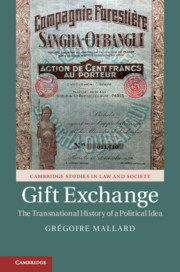The Albert Hirschman Centre on Democracy and the Global Governance Centre are glad to announce that Faculty Associate Grégoire Mallard, Professor of Anthropology and Sociology, has received the prestigious award for his new book, Gift Exchange: The Transnational History of a Political Idea.
The book was awarded the 2020 Outstanding Publication – Book Award from the section on History of Sociology of the American Sociological Association. The award was officially announced on Aug. 9.
Read more here and below the statement by the Committee, composed of Roslyn Bologh, Chair; Michael R. Hill and Peter Kivisto:
"Grégoire Mallard’s book, Gift Exchange, The Transnational History of a Political Idea, provides a history of the idea of the gift exchange. Extending Emile Durkheim’s concern with the need for and possibility of social solidarity within modern society, Marcel Mauss, the nephew of Durkehim, focused on the need for and possibility of social solidarity across societies – in international relations. A work of original research that draws on archival materials, Mallard’s book reveals the political activism around international relations by Marcel Mauss and the circles in which he moved and the central role of the gift exchange in that political activism. The book, The Gift, published in 1925, concluded that the gift exchange was a universal method (found on every continent) for managing social relations - and (re)producing a kind of social solidarity - between and among groups and societies, such as clans, tribes and nations. We learn from Mallard that Mauss and his contemporaries, using the gift exchange as the guiding idea, tried to get the French to agree to cancel or postpone payment of the reparations that had been imposed on Germany in the Versailles Treaty. From 1923 through 1924, these reparation payments figured critically in the international sovereign debt crisis that threatened the economic stability of Europe. With the failure of his political efforts, Mauss dejectedly predicted another war with Germany and a possible increase in anti-Semitism. Mallard then focuses on three other historical moments: the idea of the gift in colonial ideology and French colonial policy in the period before and after World War I; the role of Mauss’s disciples in Algeria during the period of decolonization; and the period of nationalization and attempts within international law to “decolonize the idea of the gift exchange” and create a more equitable New International Economic Order (relations between the North and the South) in the 1970s -- including especially sovereign debt cancellation. He concludes with a discussion of international solidarity and the gift exchange with respect to the Eurozone and neoliberalism. In short, Mallard’s book provides a profoundly new historical understanding of the sociological idea of the gift exchange and its significance in and for history."
The book is freely downloadable in full via the following link: https://www.cambridge.org/core/books/gift-exchange/DF1BB308065A9D2974095A6FC6242549
Also watch here the video of the panel discussion that was organised to mark the launch the book in October 2019, when Faculty members from the Albert Hirschman Centre on Democracy and the Global Governance Centre discussed the influence of “Gift Exchange” in today's debates on international solidarity, globalisation and democratic governance.



